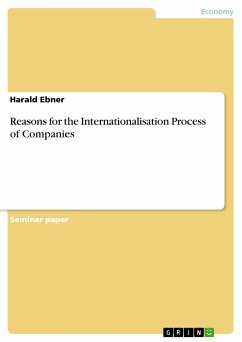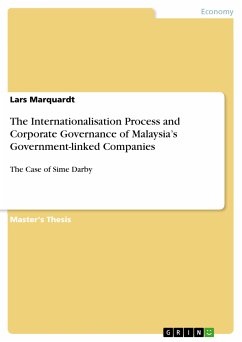Seminar paper from the year 2001 in the subject Business economics - Offline Marketing and Online Marketing, grade: A, Heriot-Watt University Edinburgh, course: International Marketing, language: English, abstract: Reasons for the Internationalisation Process of Companies I.) Introduction "Global interdependence is pervasive. It is not only political and military….[but] also environmental…. Perhaps the most important aspect of interdependence however is economic." (Terpstra, 1993, Preface) Today more and more firms operate internationally and in some cases even globally. In almost all major economies of the world, the significance of domestic and/or foreign-based transnational corporations is increasing. Such corporations, directly or indirectly, account for a large part of world trade in goods and services (cf. Nilsson, Dicken 1996 p.1). Attempts to theorise such international developments are widespread; therefore, there is no such thing as a "universal" theory. However, the emphasis of most theories tends to be on how businesses should internationalise rather than on why they should do so. Most contributions in literature focus on strategies and structures of international firms but do not explain the reasons of internationalisation. The main aim of this essay is therefore to give an outline of the reasons why companies choose to go international. Using only relevant theories and different examples from business, it shall be demonstrated that there is not only "one" motive for companies to choose international expansion but that there is a variety of causes depending on the respective internal and external environment of the different companies. In the following, under II.) there will be an overview of different reasons for companies to choose international expansion; these reasons will be substantiated by different statements and theories from literature and in each case illustrated by relevant examples. Under III.) finally, there will be a conclusion. The expositions of II.) will be analysed and a prospect into the future of globalisation will be made. [...]
Bitte wählen Sie Ihr Anliegen aus.
Rechnungen
Retourenschein anfordern
Bestellstatus
Storno









